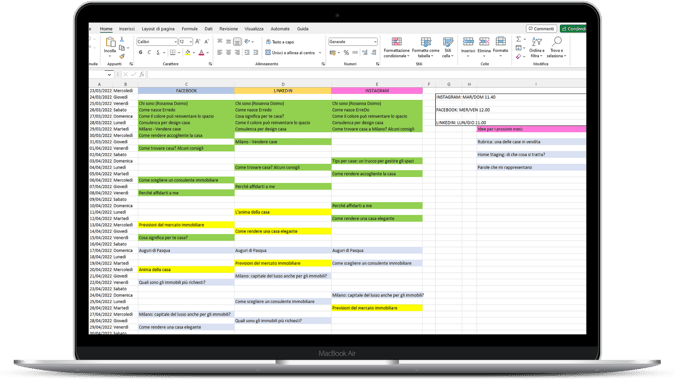
Why
Why do corporate blogging?
There are several reasons why a company can also benefit from such communication, regardless of whether it is in the B2B or B2C sector. It doesn't matter how niche the sector is or the product the company deals with is particular. The web is so vast that the only problem to be faced with is finding the target users or, even better, being found by them.
What's the point in writing a blog?
Search engines have one purpose: to give the best answers in the shortest time possible to any question asked by users. To do this, a complex system has been built that scans online content, evaluates it and decides how high it should be placed in search results. Having a site built well, with the right contents and a series of precise parameters, leads search engines to value it.
Having an active blog means having an edge in positioning on search pages. In fact, not only will the search engine place the company site to which the blog belongs higher, but every single blog article also represents an extra door to get the user to the site.
If the contents are inherent to the sector in which the company works, if they are well written and with interesting topics, users' interest is captured. Users will visit the site for longer and take it as an authoritative and useful source of information.
A blog keeps the site up and running
Search engines value sites that are renewed, because it is an indication of attention to content. Up-to-date content means, in digital logic, valuable, fresh, useful content. Having a blog on which articles are periodically uploaded means keeping the site active, enhancing it. Of course, positioning depends on many other factors, but updating content is one of them. Relying on an agency specialized in content creation is often the best solution to obtain constant and concrete results.
Writing
The writing part of the blog
Once the articulation of the articles has been defined, we move on to the writing phase. In this case, there are various parameters to take into consideration to ensure that search engines index the blog page and position it high in search results. Therefore, you need to follow the rules of SEO. The acronym means "Search Engine Optimization" and brings together all search engine optimization practices.
1. Keywords
The first thing to do for effective writing in terms of positioning is to find the keyword on which to position the article. The keyword is the keyword that is used by users to search for what they need. You need to identify, using the right tools, the keyword that best suits the article you want to write and that has the most search traffic. There are two categories:- Short-tail keywords
- Long-tail keywords
Short-tail keywords are short keywords, containing between one and three words. Being so short, they are generic. This means that they attract more traffic but have greater competition, because they are more used.
Long-tail keywords contain more than three words, which makes them more specific. They bring less traffic, but allow for less competition. This way, it is easier for the article to appear higher in search results.
2. Titles and subtitles
The chosen keyword must appear in the title. It is even better if it is placed at the beginning, but it is not a necessary condition. You can also write titles that do not contain the keyword, but you will naturally be disadvantaged. The title, in any case, can also be written once you have finished writing the article.
The blog article must be divided into paragraphs, which usually must not exceed three hundred words, preceded by subtitles. These must recall the content of the article, i.e. at least two of these must contain the keyword. It is good that there is a title, only two subtitles and several sub-subtitles, but without exceeding.
3. Content
As regards the actual text, there are various indications. The length must be at least three hundred words. Shorter texts may seem easier to read, but search engines do not consider them long enough to actually contain the answer to the needs of the user who carried out the search.
Search engines favor hypertexts, i.e. texts linked to other texts. For this reason, links must be present within the text. These links must be:
- Interior
- External
Internal links are links that refer to internal pages of the blog itself. External links refer to blogs, sites, platforms external to the website. It is important that these pages are authoritative sources, or the article will be disadvantaged. However, you shouldn't overdo the number of links either. A good number can be two internal and two external. As internal links, calls to action can be inserted in the article, which refer to the contact page and encourage contact between user and brand.
To aid reading of the text, bulleted lists and bold words can be used. It is not recommended to use underlined words, because they are too similar to the words with a link and would lead the reader to confuse them.
A detail not to forget are the images. A cover image consistent with the content and those of the other articles must be inserted. In this way, by browsing the site and arriving at the blog page, you will be able to find a concordance between the various articles. It is a good idea to insert images or videos even within the text, without however exceeding them, or the written content will fade into the background. The images must be renamed with the title of the article and the name of the site to which they belong. In some cases it is also necessary to reduce its weight, so as not to slow down the loading of the page.
Finally, we must also take care of the meta description. This is the short description that appears under the main title in search results. It must briefly summarize the article, encouraging users to read it, and must contain the keyword.
4. Promotion on social media
To complete the work and sponsor the contents created, communication can be integrated by re-sharing the articles on social media. Some social networks don't allow you to see the preview, like Instagram, but others do. We are mainly talking about Facebook and LinkedIn, the main social networks on which to communicate your brand. Together with the re-sharing link, it is a good idea to briefly describe the content of the article, inserting a final call to action.
Step
The steps to follow to write a blog
Keeping a blog, therefore, requires constancy. It is a job that must be done in the long term, with a view to building a good position over time. In fact, it is unthinkable to obtain excellent results in a short time, but constancy pays off. There are several steps you can follow to organize and run a blog.

Define a target
Who might be interested in the business advertised on the site? Is there a specific language to use? Can specific terms belonging to the sector be used or is it better to use simpler formulas?
There are many questions and they all serve to give guidelines to follow in writing. In this way, the articles not only adapt to the target, but will maintain consistency with each other and with the site to which they belong. They will adapt to the brand's identity even when communicating information.

Define a PED
Through the PED, you can plan the days on which to publish and the related topics to cover. Possibly, you can link back to anniversaries and holidays, also declining the articles depending on these, if they are consistent with the brand and the topics it could cover.
A time schedule also helps to organize your writing work.

Structure the articles
Various images or videos should also be included in the article to better describe the content or support it, as well as adding a cover. Furthermore, links must be inserted that refer to the site itself and to external sites. This will enrich the page.

Publication and promotion
Some social networks do not allow the re-sharing of a link, such as Instagram, but you can always make dedicated posts and stories that link to the brand's website. On others, such as Facebook and LinkedIn, resharing the article allows you to preview it.
Digital Tips
What does a Digital Agency do?
Digital agencies mainly deal with promoting a company's brand and/or the products ands services it offers. The ultimate goal is always to help these companies grow their business.
Ekeria is an agency specialized in the digital world, i.e. it uses online channels to support companies in their growth path.
In our Blog you can read the latest articles with teends from the world of digital marketing, written by our experts.
Contact
We are carving out a place among the best Digital Agencies in Milan.
Our experts will be able to advise you on how to carry out your project, creating and keeping your company's blog active.
Ekeria is a digital agency based in Milan. As a web agency, we deal with the design and creation of websites and e-commerce. We offer SEO services for website positioning and social media management. We carry out digital advertising activities such as Strategic Marketing, Lead Generation, Google Services, E-mail Marketing. We help you develop and create content to strengthen your brand identity and acquire new customers.
P.IVA 11617960965
Via Alessandro Tadino 42,
20124, Milano (MI)
©2024. Ekeria S.r.l | Privacy | Cookie | Termini e Condizioni